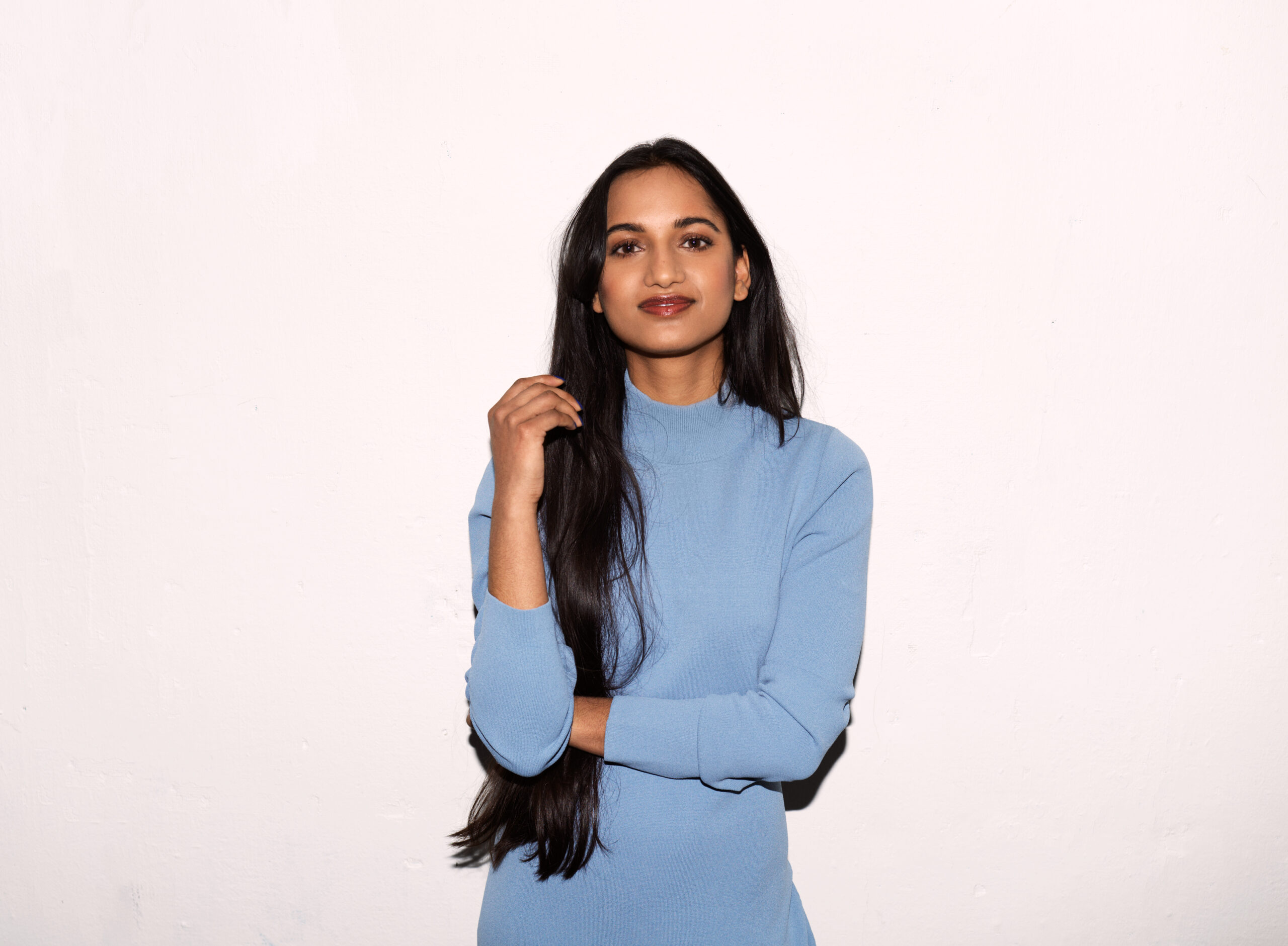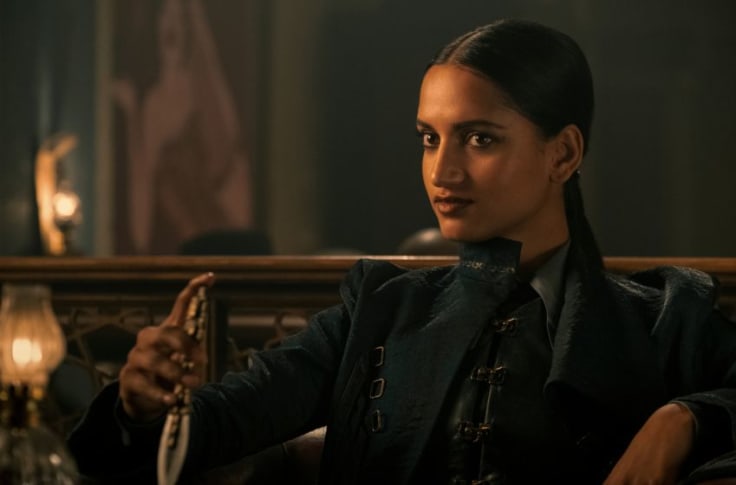
Photography by Joseph Sinclair
‘My story is so rare, I shouldn’t even be here’: meet Shadow and Bone’s Amita Suman
The actor, who plays Inej Ghafa in Netflix’s latest YA offering, on first-gen immigrant possibilities, the ‘Brownface’ stunt double controversy and her dream role.
Charlie Brinkhurst Cuff
31 May 2021
Over Zoom, the Shadow and Bone actor Amita Suman gives off the same polish as she does on screen. Glossy-haired and kind-eyed, her introduction to worldwide fame has been conducted mainly online, but that doesn’t mean it hasn’t been intense; she’s just prepared.
While her character, Inej, plays a secondary role to Alina Starkov’s lead – anyone who knows anything about the Grishaverse (the YA book series that the Netflix series is based on), understands that she is at the heart of the good-meets-evil fantasy story, and therefore has a rich seam of the fandom dedicated to her. A spy, acrobat and knife expert from a nomadic, brown-skinned people called the Suli, Inej’s quiet but kind demeanour alongside her studied moral ruthlessness makes her one of the most compelling characters.
Much like her character, 23-year-old Suman cites herself as being spiritual, “one of those lucky people that gets their prayers answered”, and throughout our interview talks beautifully about her artistic process and her Nepalese heritage. She also expertly bats away a question on the controversy that’s surrounded her stunt double (a white Hungarian woman who fans have accused the show of putting in brownface and a brown bodysuit during her stunt scenes), quite rightly citing it to be a question for the institutions who made the casting choice.
Suman’s life story sometimes feels like a collection of extreme ‘firsts’: as someone who grew up in a tiny village without electricity, who didn’t see a TV until they were four years old, she strikes me as a person who is going to remember the beginnings of all of the unexpected opportunities in her life. This is her story:

gal-dem: In a few interviews, it’s been said that the Shadow and Bone team set eyes on you and immediately saw you as Inej. But what do you feel you brought to the role as an individual? What emotions did you bestow her with from your own lived experience?
Amita Suman: I have the experience of what it’s like to move countries and move into a completely new world, and adapt and learn the language and figure out how life works in this new situation that you’re in. That was the experience that I could bring to Inej from a very real point of view. Inej also has a very strong moral compass. She tries to find the beauty in the world and see good things always. As a brown character predominantly in a white place, even in Ketterdam, she celebrates her uniqueness, and she fights for equality in such a powerful way. So that’s something that I took away as well – to try and do that, not out of fear, but out of empowerment. That was a really, really important lesson that I didn’t know I needed to learn until I did and it’s something that I will always carry forward with me.
Do you remember when your parents told you that you were going to be moving to the UK, and what you thought it would be like in your head versus what it actually was like when you got here?
Amita: When I found out the news, I had no education at all. I didn’t even know the world was round. I hadn’t been on a plane. I’d only ever seen them really, really high in the sky and they were [pinches fingers] like that small. So, I remember being really excited to be going into this completely new world and going into the future and experiencing roads in a car and supermarkets, and all of these things for the first time. I love my routine, but I also love change. The only thing I didn’t like was the weather because it was always grey in the UK. And I found that really, really depressing. In Nepal, it’s blazing sun constantly and everything is so bright and the colours are just iridescent. And then when I came over here it was just grey clouds and no blue skies and rain and that really affected my mood. But apart from that, it was a really, really exciting time. Coming here opened this huge window where almost anything was possible.
How do you understand Inej through the framework of her being a survivor of sexual exploitation? What research did you do into that aspect of her character?
What Leigh Bardugo, the writer of Shadow and Bone, did so beautifully was creating all of these characters that have gone through so many real things that a lot of women can connect with, and men as well – regardless of gender. Everyone has their own choice of how they want to deal with their trauma, and no matter what their choice is, it should always be respected. I listened to a lot of TED talks about people who have gone through such a horrific thing and how they dealt with it, and how long it took them. With Inej, even though she’s gone through all of this and it will always be a huge part of her, she’s learned to still move forward, live life and make sure that other people don’t go through the same thing. Just seeing someone still move on, but not forget, and have those scars, but still live their life to the fullest. It’s a really inspiring story.
Since the show has broadcast, there’s been conversations in fan spaces around Brownface (in relation to your stunt double, who was a white woman), colourism and mixedness. Did you anticipate that? Is it something to be raised with the creators of the show?
I think that’s a really, really great question, and I would love to answer it. But because I didn’t have any choice of who my stunt double was going to be, I think that’s a great question for Netflix. I don’t feel it’s right for me to say anything as of yet. But it’s a great question. Everyone has their opinion. And whatever you do in life, if you’re doing it for the world, you will never make everyone happy, basically. And that’s totally fine. If, say, we go for a Season Two, I want to see the things that I can improve on.
I’ll hold on to that one for the next time I get Netflix on the phone. What do you think that your childhood self would think of where you are now?
Shocked. Completely shocked. You know, I’m Nepalese. I was born in a village with barely any people. My story is so rare, I shouldn’t even be here. We lived in a clay house. We grew our own food, no tractors, no motorbikes, you know, no electricity, nothing. So, the fact that I’m here doing what I love worldwide and sharing it with so many people, sometimes even I have to pinch myself and think: is this really, really happening? So, baby me, I think she would think this was the dream. And she wouldn’t quite believe it. But at the same time, this was always my dream from the very beginning. I remember seeing a TV for the first time, maybe when I was like, three or four, in the village. And it was just this tiny thingy, and it took us ages to find some sort of electricity to get it running. It was in that moment, I felt inspired. I knew that that was my goal.
And what do the people around you think?
They’re just really, really proud. Obviously, I’m the first in my family to be doing something as wonderful as this. And I think probably the first in my village. My mum and dad were able to watch Shadow and Bone because it was dubbed in Hindi – it’s the first time they literally understood the whole series, [before] they didn’t know what the hell was going on! It was a really emotional moment. And, you know, I was fortunate enough to have been on the cover of Wonderland with one of my best friends, Jessie Mei Li [who plays Alina Starkov]. I was thinking, “I wonder if I’m the first Nepalese person to be on there”. I mean, I don’t know if that’s the case or not. But yeah, everyone’s just so proud, everyone shocked as well, because this is so rare. And I just want to carry on going forward, being a brown actress in the industry.
Have you always felt empowered to speak up about your racial identity?
No, I haven’t. I feel so ashamed to admit that. But you know, when I first came to this country, it wasn’t anything that was talked about. It was a taboo situation and you kind of just had to live with that because people were afraid. And I don’t blame them. You know, it’s only recently – not too recently – where I’ve learned to speak about it from a place of power, instead of a place of fear. But education is so important.
And as we come out of lockdown, what’s the one thing you’ve learnt about yourself in this time period that you want to carry forward?
It’s been a bloody tough year. I’ve been so busy: uni, then college, straight into drama school, then straight into work. And then suddenly, when quarantine happened, it was just absolutely nothing. I didn’t know what to do with my time, but I ended up focusing on my mental health for the first time and having lots of time to figure out how to do that correctly. I started therapy and I didn’t know I needed it until I started it. After every session, I was just like, ‘Yeah, thank God.’
What’s your dream future role?
Great question. I’ll tell you what I do love: Monster with Charlize Theron. And I could barely watch that movie because it was so intense, but in the best way possible. And if I could have a role like that, where it’s super gritty, and you’re talking about something really important… I would love to do period drama as well. I love Pride and Prejudice to bits. I would love to do Tomb Raider. I want to do anything and everything, basically! I just want to be telling stories that are worth telling, that are important, and spark conversation.
This interview has been edited and condensed for length and clarity.







